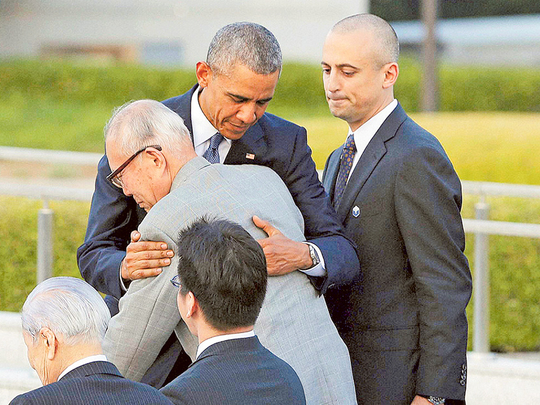
In the wake of US President Barack Obama’s visit to the Japanese city of Hiroshima last week, international media is weighing in on whether this historic gesture has the power to put nuclear proliferation on the skids and make countries do soul-searching over their nuclear ambitions and its ultimate futility.
Japan’s leading daily, Asahi Shimbun, applauded Obama for his radical overture. Said its editorial, “We applaud Obama for his fresh determination to accelerate progress in nuclear arms reduction in the city that was devastated by an atomic bomb seven decades ago.
“His historic visit to Hiroshima must not be allowed to end up as just a flash in the pan. Turning this landmark event into a real first step towards a world without nuclear weapons requires vigorous actions from both the United States and Japan.
“The fact that the leader of the country responsible for the attack reflected on the scourge of war in the city that was enveloped in a mushroom cloud will go down in history as an important chapter in the nuclear age.” The paper expressed hope that Japan too would come to terms with its past excesses.
“Unless the nuclear powers and their allies wean themselves from their dependence on nuclear weapons, there can be no progress towards a world without nuclear weapons,” it concluded.
Another national daily of Japan, The Mainichi, offers similar hope for a nuclear arms-free world. “We want to think of this day as a new starting point in the path to a world without nuclear weapons. ... we must not turn President Obama’s visit to Hiroshima into a mere ceremony,” stated its editorial.
“Obama has eight months remaining as president. We hope that he will utilise the time he has left and leave behind a concrete political legacy providing a foothold to realise a world without nuclear weapons,” it said.
The Jamaica Observer too hoped for a scaling back on the nuclear run that many countries are engaged in. “United States President Barack Obama’s visit to Hiroshima in Japan on was a politically bold and sensitive move that will hopefully energise the world to dismantle nuclear weapons,” said the Observer’s editorial.
“Indeed, President Obama was on point as he stated that nations need to view their “growing interdependence as a cause for peaceful co-operation and not violent competition”. The paper stated that “there is hope in united action and co-operation among the world’s majority who, we believe, uphold the principle that every life is precious and worth protecting, and that all men are created equal.”
UK’s Guardian however expressed less optimism on the prospects of what Obama’s visit would achieve.
It said in its editorial, “The world continues to live in the shadow of the bomb, and looks set to do so after the age of Obama, too. It can only be a good thing that, for the first time, a sitting American president [paid] respect to Hiroshima’s victims. Obama likes symbols and is good at speeches. But the visit also lays bare the daunting gap between a laudable, idealistic vision, and the hard realities and choices that presidents must so often confront.”
India’s The Hindu newspaper lauded Obama’s call for a “moral revolution” but also pointed to “the long and arduous road ahead” for the world indulging in nuclear catch-ups. “As expected, US President Barack Obama did not utter any apology on behalf of his country for dropping an atomic bomb on Hiroshima in 1945. But such is the power of personal presence that by the simple act of laying a wreath at the Hiroshima Peace Memorial on Friday, he sent out an uncommonly gripping message: you cannot truly commit yourself to preventing a repeat of an atrocity if you do not admit in the most candid manner that it in fact occurred,” said its editorial.
“Obama’s call for a “moral revolution” issued at Hiroshima makes the sober, and sobering point that the wrongs of living memory cannot be evaded, no matter what the provocation, and he did dwell on wartime Japan’s excesses. In his two terms in the White House, Obama has made a modest beginning. Understanding his realism is critical to covering the long and arduous road ahead,” the paper concluded.





_resources1_16a31069e4e_small.jpg)






